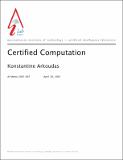| dc.description.abstract | This paper introduces the notion of certified computation. A certified computation does not only produce a result r, but also a correctness certificate, which is a formal proof that r is correct. This can greatly enhance the credibility of the result: if we trust the axioms and inference rules that are used in the certificate,then we can be assured that r is correct. In effect,we obtain a trust reduction: we no longer have to trust the entire computation; we only have to trust the certificate. Typically, the reasoning used in the certificate is much simpler and easier to trust than the entire computation. Certified computation has two main applications: as a software engineering discipline, it can be used to increase the reliability of our code; and as a framework for cooperative computation, it can be used whenever a code consumer executes an algorithm obtained from an untrusted agent and needs to be convinced that the generated results are correct. We propose DPLs (Denotational Proof Languages)as a uniform platform for certified computation. DPLs enforce a sharp separation between logic and control and over versatile mechanicms for constructing certificates. We use Athena as a concrete DPL to illustrate our ideas, and we present two examples of certified computation, giving full working code in both cases. | en_US |
